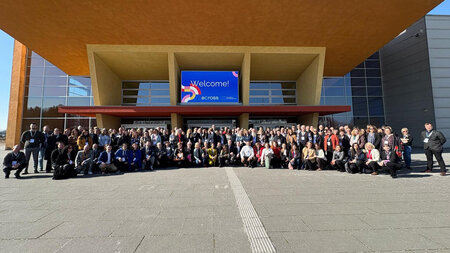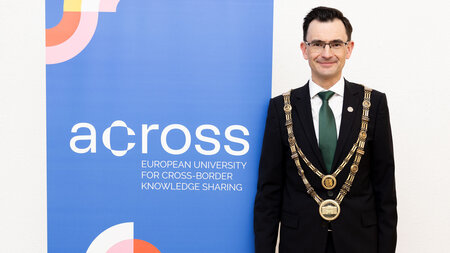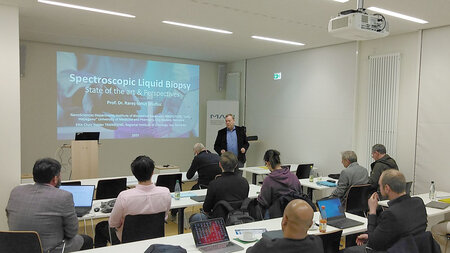Focus: Digitalization of the Circular Economy for Increased Sustainability
Professorship of Production Systems and Processes at Chemnitz University of Technology contributes expertise in the field of Augmented Reality to an EU project focusing on large-scale recycling of electronic waste
-

The consortium of the EU project DiCiM at the kickoff meeting at Masaryk University in Brno, Czech Republic. Source: Masaryk University
According to Statista, 42.5 percent of electronic waste was recycled in Europe in 2019, while the European Union's target is 65 percent. Researchers aim to close this gap further in the EU project "Digitalised Value Management for Unlocking the potential of the Circular Manufacturing System with integrated digital solutions – DiCiM", in which the Professorship of Production Systems and Processes (head: Prof. Dr. Martin Dix) at Chemnitz University of Technology is significantly involved. The project started in January 2023 and is funded with a budget of six million euros, with around 609,000 euros going to Chemnitz University of Technology.
In total, twelve project partners from eight countries aim to develop a cutting-edge open platform and integrated digital solutions within four years that will elevate the digitalization of Europe's recovery system for electrical and automotive waste to a new level. The project aims to develop new technology for monitoring and assessing the condition of components to be recycled. These components are expected to be reprocessed and used for the repair of household appliances, printers, and cars in the future. For this purpose, tools will be developed in the project that utilize the Internet of Things (IoT), Machine Learning (ML), Artificial Intelligence (AI), Big Data, image processing, and Augmented Reality (AR). The results of the research work will be implemented across Europe in pilot projects with multiple users. "With the help of the planned platform, approximately one million additional spare parts for reprocessing are expected to be made available within the EU each year, resulting in an annual saving of 4,500 tons of CO2," says David Póč, Director of Strategy at Masaryk University in Brno (Czech Republic), which is coordinating the project.
"The recovery of valuable components requires individual instructions for each device to be recycled. We are delighted to be able to contribute our expertise to the consortium by providing augmented reality-based disassembly instructions for devices to be recycled, based on exemplary use cases from our practical partners," says Dr. Mario Lorenz, research assistant at the Professorship of Production Systems and Processes at Chemnitz University of Technology.
Project participants include employees from Masaryk University (Czech Republic), Chemnitz University of Technology (Germany), KTH Royal Institute of Technology (Sweden), University of Ljubljana (Slovenia), IDENER Research & Development Agrupacion de Interes Economico (Spain), IRIS Technology Solutions S.L. (Spain), Signifikant Svenska AB (Sweden), C-ECO Circular Economy Solutions GmbH (Germany), Gorenje (Slovenia), Arcelik (Turkey), Lexmark (Hungary), and Crowdhelix Limited (Ireland). The project is funded by the European Union's Horizon Europe research and innovation program under Grant Agreement No. 101091536. The topic is aligned with the European Green Deal strategy and EU legislation on repair as well as the objectives of the Digital Decade of the European Union.
For more information, please contact Dr. Mario Lorenz, Chemnitz University of Technology, tel. +49 371 531-39366, e-mail mario.lorenz@mb.tu-chemnitz.de.
(Authors: Katja Klöden, Mario Steinebach)
Matthias Fejes
14.04.2023





